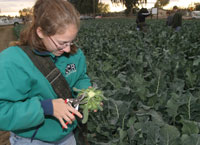School sees first organic crop

Joseph Vasquez / The Collegian
One of the students who got to harvest Fresno State’s first organic crop Thursday was senior enology and viticulture major Krystal Goulart. |
By Bradley Hart
The Collegian
A university-owned field has yielded what is the first organic crop in Fresno State history.
A crop of “transitional organic” broccoli was harvested Thursday morning by a campus organization called Students for Environmentally Responsible Agriculture.
“As far as I know, this is the first organic product to be farmed and sold here on campus,” SERA president Brian Smith said in an e-mail.
About half a dozen volunteers braved light rain to hand-cut the vegetables from the less-than-an-acre site near the corner of Barstow and Chestnut Avenues. Smith said the harvest was expected to take about half an hour, though some plants were not fully developed.
The land used for the crop was given to the club by the university earlier this year and the broccoli plants were planted in mid-September by club volunteers.
To be certified as organic produce, the crop must not be exposed to most synthetic pesticides or other chemicals for three years.
Because previous crops in the area were not organic, the broccoli will not be considered fully organic. Instead it receives the lesser distinction of “transitional organic.”
Organic farming does allow the use of some diluted chemicals that are effective for a smaller amount of time than traditional varieties. Because of this, Smith said the physical labor required for organic crops is greater than for typical crops, thus limiting the size of most cultivations.
“The Valley is mostly large-scale farming,” Smith said. “Organic farms are usually small-scale because of the amount of labor involved.”
SERA members said they visited their plot every week or so over the course of the semester, often hand-weeding the rows of plants.
Smith suggests produce buyers choose organic and locally-grown products because organic farming is more environmentally friendly than traditional methods.
SERA officials said they plan to plant more organic crops on the site in the future, including a more diverse assortment of plantings in the spring. Until then, a winter “cover crop” will likely be planted to help naturally return nutrients to the soil.
Fresno State has also added a plant science class dedicated to organic farming to be offered next semester for the first time.
“Someone told me recently that organic food production is growing about 20 percent per year,” Smith said. “So it is becoming very important.”
The broccoli crop, consisting of nearly 4,000 plants, will be sold in the university’s Farm Market and at Whole Foods, a local organic foods market at Fig Garden Village.
Comment on this story in the News forum >>
|
